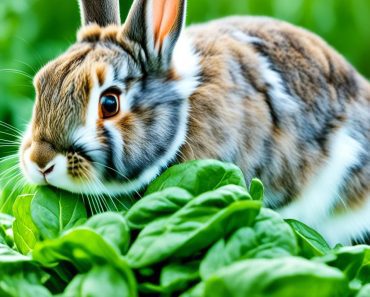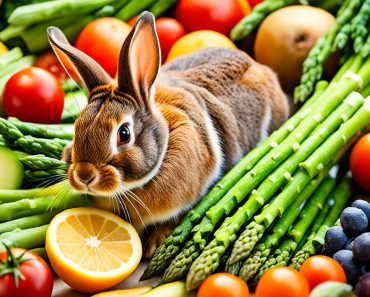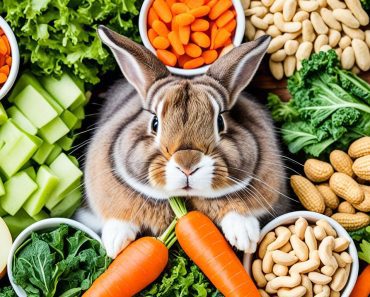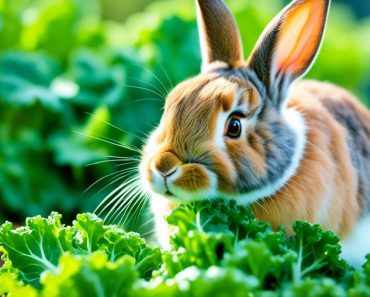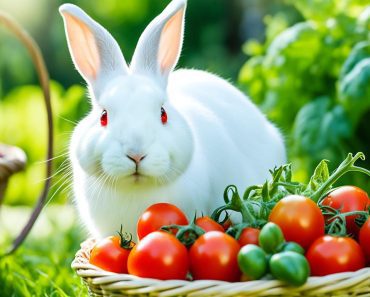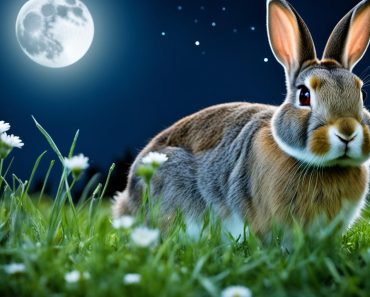As a responsible owner of a pet rabbit, you may be curious about adding new flavors and variety to their diet. Mint, with its refreshing aroma and taste, might seem like a potential option. But can rabbits safely consume mint? In this article, I will explore the topic of feeding mint to rabbits and provide essential tips for responsible ownership.
Rabbits have specific dietary needs that require careful consideration. It’s important to understand what foods are safe for them to ensure their health and well-being. Mint can offer both potential benefits and risks, so it’s crucial to gather accurate information before introducing it into your rabbit’s diet.
Can Rabbits Eat Mint? Yes, in small amounts, it’s generally safe.
- Feeding mint to rabbits should be done in moderation and as an occasional treat.
- Mint offers potential nutritional benefits such as fiber, vitamins, minerals, and water content.
- Monitor your rabbit’s response when introducing mint, and discontinue if any signs of discomfort or digestive upset occur.
- Choose organic mint when possible to minimize potential exposure to pesticides.
- Maintain a balanced diet for your rabbit, focusing on hay, fresh vegetables, and high-quality rabbit pellets as the primary components.
Understanding a Rabbit’s Dietary Needs
To ensure the health and well-being of pet rabbits, it’s important to understand their dietary requirements. Rabbits thrive on a high-fiber diet that includes hay as a staple food. Hay provides essential nutrients, aids in digestion, and keeps their teeth in check. Alongside hay, rabbits can enjoy a variety of fresh vegetables and occasional treats. Maintaining a balanced diet is crucial for their optimal health.
Rabbits have unique dietary needs that are essential for their overall well-being. As herbivores, their digestive systems are designed to process plant-based foods. It’s important to provide them with a high-fiber diet to support proper digestion and prevent common health issues.
The foundation of a rabbit’s diet should be fresh hay. Hay is not only a source of fiber but also satisfies their natural instinct to chew, promoting dental health. It should be available at all times for them to graze on. Good-quality hay, such as Timothy or Orchard grass, is preferred and should be free from mold or dust.
In addition to hay, fresh vegetables should be included in a rabbit’s diet. Leafy greens like romaine lettuce, kale, and parsley are excellent choices. However, it’s important to introduce new vegetables gradually to prevent digestive upset. Rotate the greens to provide a variety of nutrients.
Occasional treats can be given to rabbits, but they should be limited and offered in moderation. Treats can include small pieces of fruits, such as apples or berries, but should only be given sparingly due to their higher sugar content. Always ensure that the treats are safe and appropriate for rabbits.
Note: It’s important to avoid feeding rabbits foods that are toxic to them, such as chocolate, caffeine, onions, and garlic. These can be harmful and should be strictly avoided.
Meeting a rabbit’s dietary needs is crucial for their overall health and well-being. A balanced diet consisting of hay, fresh vegetables, and occasional treats will provide the necessary nutrients and promote optimal digestion. It’s important to consult with a veterinarian or a rabbit expert for specific dietary recommendations based on your rabbit’s age, breed, and health.
The Nutritional Profile of Mint
Mint offers a range of potential health benefits for rabbits due to its impressive nutritional profile. Let’s take a closer look at the vitamins, minerals, fiber, and water content found in mint, and how these contribute to a rabbit’s overall health.
Vitamins in Mint
Mint is a rich source of vitamins, particularly vitamin A and vitamin C. Vitamin A is essential for maintaining healthy eyesight and promoting a strong immune system in rabbits. Vitamin C, on the other hand, plays a crucial role in collagen production, helping to support healthy skin and tissues. Including mint in a rabbit’s diet can help ensure they meet their daily vitamin requirements.
Minerals in Mint
Mint contains an array of essential minerals that are beneficial for rabbits. Calcium is necessary for maintaining strong bones and teeth, while potassium contributes to proper muscle functioning. Phosphorus plays a vital role in cell development and energy production. By incorporating mint into their diet, rabbits can obtain these essential minerals to support their overall well-being.
Fiber in Mint
Fiber is a critical component of a rabbit’s diet as it aids in digestion and maintains a healthy gut. Mint is a good source of dietary fiber, which helps regulate bowel movements and prevents digestive issues. Including mint in their diet can promote a healthy digestive system for rabbits.
Water Content in Mint
Hydration is key to a rabbit’s overall health, and incorporating foods with high water content can contribute to their daily fluid intake. Mint has a significant water content, which can help keep rabbits hydrated and support optimal bodily functions.
Overall, mint’s nutritional profile makes it a valuable addition to a rabbit’s diet. It offers vitamins, minerals, fiber, and water, all of which are essential for maintaining their health and well-being.
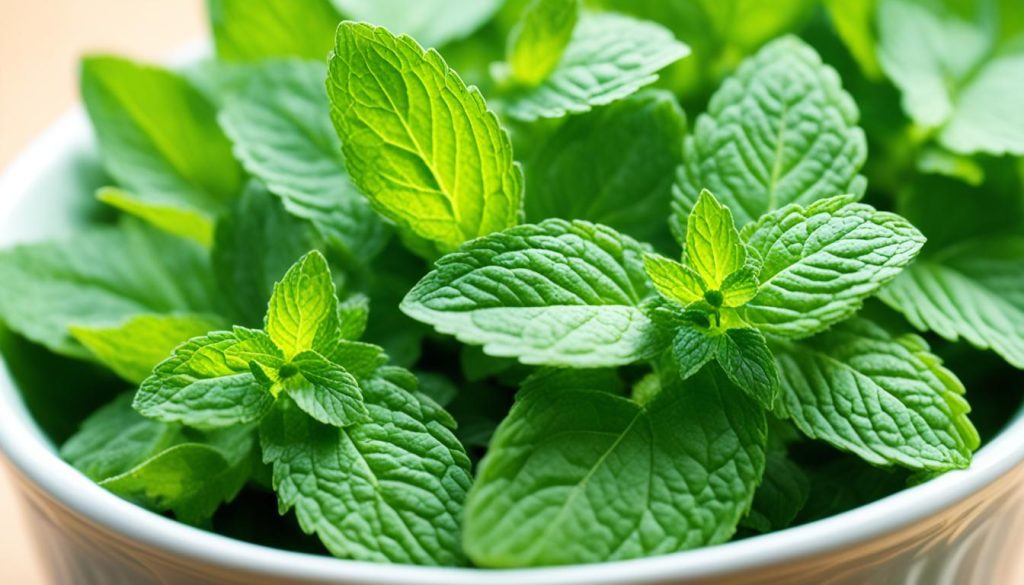
Feeding Mint to Rabbits
Mint can be a delightful addition to a rabbit’s diet, providing a refreshing touch to their meals. However, it’s important to utilize moderation when feeding mint to rabbits. Mint should be offered as an occasional treat rather than a staple food. Introducing mint gradually allows you to observe your rabbit’s response and ensure their digestive system tolerates it well.
If you notice any signs of discomfort or digestive upset, such as changes in appetite, diarrhea, or bloating, it’s best to discontinue feeding mint to your rabbit. Each rabbit may have different tolerance levels, so it’s essential to monitor their well-being closely.
Choosing organic mint can be beneficial for your rabbit’s health. Organic mint reduces the risk of potential pesticide exposure, ensuring a safer treat option for your furry friend. Organic mint can be sourced from reputable pet stores or even your own garden if you grow it without the use of chemicals or pesticides.
You can incorporate mint into your rabbit’s diet in various ways. One approach is to use mint as a flavoring agent for their water. Adding a few leaves of fresh mint to their water bowl infuses a subtle, refreshing taste that can encourage hydration.
Another option is to use mint as an ingredient in homemade treats. You can find simple and rabbit-safe recipes online that incorporate mint, such as mint-infused hay cubes or mint-flavored biscuits. These treats can provide mental stimulation and keep your rabbit entertained.
Remember, mint should never replace the primary components of a rabbit’s diet. High-quality hay, fresh vegetables, and well-balanced rabbit pellets should remain the foundation of their daily meals. Mint is simply a complementary addition that can add variety and a burst of flavor to their diet when offered in moderation.
Potential Risks of Feeding Mint to Rabbits
While mint is generally safe for rabbits, it’s important to be aware of potential risks that may arise. Some rabbits have sensitive digestive systems, and consuming mint can result in digestive upset. It’s crucial to monitor your rabbit’s response to mint and discontinue feeding if any signs of discomfort or digestive issues occur.
In addition to digestive upset, certain varieties of mint and excessive amounts can pose a risk of toxicity to rabbits. It’s always recommended to offer mint in moderation as an occasional treat, rather than as a regular part of their diet. This helps to minimize the chances of any potential adverse effects.
Allergic reactions to mint are also a concern for rabbits. While uncommon, some rabbits may exhibit allergic reactions such as itching, swelling, or respiratory distress when exposed to mint. If you observe any of these symptoms after feeding mint to your rabbit, it’s important to discontinue its use and consult a veterinarian for further guidance.
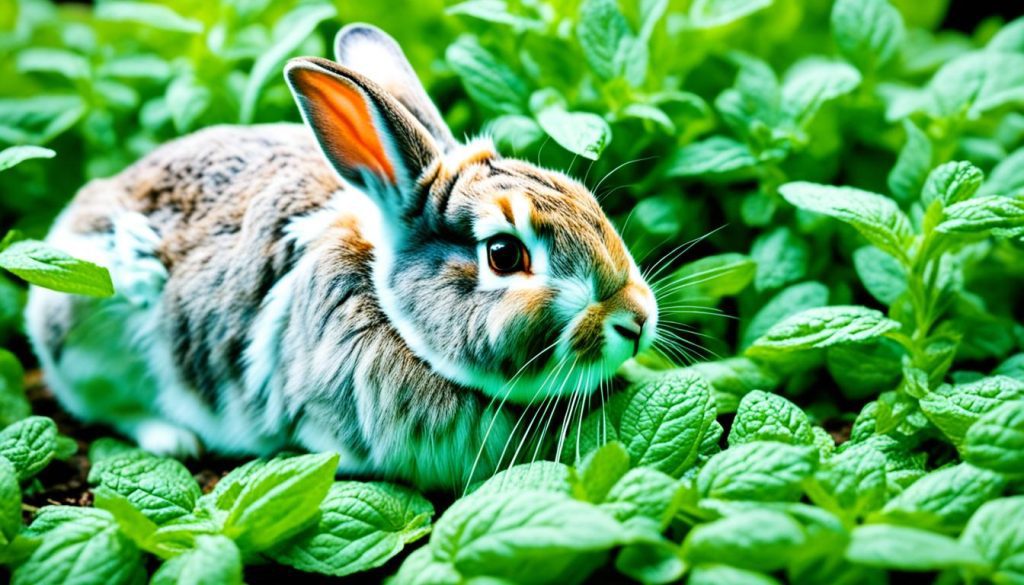
It’s crucial to prioritize the well-being of your rabbit by carefully observing their response to mint and taking necessary precautions. Always introduce mint gradually into their diet and monitor for any adverse reactions. By being proactive in your approach, you can ensure a safe and enjoyable experience for your furry friend.
Other Considerations for Rabbit Diet
When it comes to providing a healthy diet for your rabbit, it’s important to consider a few key factors. While mint can be a tasty addition to their meals, it should be seen as a complement rather than a replacement for the primary components of their diet.
The primary component of a rabbit’s diet is fresh hay. Hay is essential for their digestive health, dental care, and overall well-being. It provides the necessary fiber that keeps their digestive system functioning properly. Make sure to offer a variety of fresh hay options to keep your rabbit engaged and interested in their food.
In addition to hay, high-quality rabbit pellets should also be included in their diet. These pellets are specially formulated to provide the necessary nutrients and vitamins that rabbits need to thrive. Look for pellets that are rich in fiber and free from unnecessary additives or fillers.
Variety is important when it comes to a rabbit’s diet. Alongside hay and pellets, fresh vegetables can be introduced in limited servings. Vegetables such as dark leafy greens, carrots, and bell peppers can provide additional vitamins and minerals. Ensure that the vegetables are thoroughly washed and free from any pesticides or harmful substances.
Remember to introduce any new foods gradually and observe your rabbit for any signs of digestive upset or allergies. Every rabbit is unique, and their tolerance to certain foods may vary.
Lastly, as we mentioned earlier, mint can be a delightful addition to your rabbit’s diet, but it should be offered in moderation. Mint can provide a change in flavor and aroma that can stimulate their appetite. However, it should not replace the primary components of their diet, such as fresh hay and high-quality pellets.
Benefits of a Balanced Diet
Providing a balanced diet for your rabbit is essential for their overall health and longevity. A balanced diet ensures that your rabbit receives all the necessary nutrients they need to maintain a strong immune system, healthy digestion, and a shiny coat.
A varied diet not only keeps them physically healthy but also mentally stimulated. Offering a range of foods can prevent boredom and encourage natural foraging behaviors.
By incorporating fresh hay, high-quality pellets, and limited servings of fresh vegetables into their diet, along with the occasional treat like mint, you can rest assured that your rabbit is receiving the nutrition they need to thrive.
Remember, when it comes to your rabbit’s diet, it’s best to consult with a veterinarian or a rabbit nutrition specialist for personalized advice and guidance based on your rabbit’s specific needs.
Conclusion: Mint as a Part of a Rabbit’s Diet
Mint can be a delightful and refreshing addition to a rabbit’s diet when offered responsibly. With its potential nutritional benefits and aromatic stimulation, adding mint to a rabbit’s diet can provide a change in flavor and offer variety. However, it’s important to remember that mint should not replace the primary components of a rabbit’s diet.
The mainstay of a rabbit’s diet should consist of fresh hay, which provides essential fiber and nutrients, promotes healthy digestion, and keeps their teeth in check. High-quality rabbit pellets and limited servings of fresh vegetables also play important roles in providing a well-rounded and balanced diet for rabbits.
When incorporating mint into a rabbit’s diet, moderation is key. Mint should be offered as an occasional treat rather than a staple food. It’s important to observe how the rabbit reacts to mint and introduce it gradually. If any signs of discomfort or digestive upset occur, mint should be discontinued.
The responsible feeding of mint to rabbits involves choosing organic varieties whenever possible to minimize potential pesticide exposure. Mint can be used as a flavoring agent for water or treats, adding a refreshing touch to their diet.
By maintaining a balanced and varied diet, rabbit owners can ensure the optimal health and happiness of their furry friends. Remember to prioritize hay, fresh vegetables, and high-quality rabbit pellets as the primary components of a rabbit’s diet, while responsibly adding mint to provide a delightful sensory experience.
Resources for Rabbit Diet Information
When it comes to ensuring a healthy and balanced diet for your rabbit, it’s important to have access to reliable information and resources. Fortunately, there are several reputable sources available that offer valuable insights into rabbit nutrition and safe food choices.
A great starting point is the House Rabbit Society, a well-known organization dedicated to rabbit welfare. They provide comprehensive guides and articles on rabbit care, including information on diet and nutrition. Their expertise can help you make informed decisions about what to feed your furry friend.
In addition to the House Rabbit Society, there are also numerous rabbit care guides and websites specifically focused on rabbit nutrition. These resources offer a wealth of information on safe foods for rabbits, portion sizes, and the nutritional requirements of these adorable pets. By consulting these resources, you can ensure that you are providing your rabbit with a balanced and nutritious diet.
Remember, the health and well-being of your rabbit depend on their diet. By utilizing these rabbit diet resources, you can make informed choices and provide your furry friend with the best possible care. Remember to always consult with a qualified veterinarian for personalized advice regarding your rabbit’s specific dietary needs.

